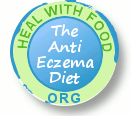Top 5 Diet Tips for People with Eczema

The paragraphs below present 5 excellent tips on how to treat and cure eczema symptoms with diet. Important notice: The information below and elsewhere on this website is not intended or implied to be a substitute for professional medical or health advice. Always seek the advice of a certified nutritionist or a qualified health care professional before making drastic modifications to your diet or before taking vitamin or mineral supplements.
#1: Include Omega-3 Fatty Acids in Your Diet
Tip #1: Make sure to include foods rich in omega-3 fatty acids in your anti-eczema diet. A growing body of evidence suggests that omega-3 fatty acids can help reduce the severity of symptoms associated with eczema flare ups. In one clinical trial, 44 patients with atopic eczema were given either 5.7 grams omega-3 fatty acid supplements or placebos. During the eight week trial period, those who consumed the omega-3 fatty acids cut their symptoms by almost a fifth. These protective effects are believed to result from the anti-inflammatory properties these fatty acids possess. Today, most modern diets in Western countries do not contain adequate amounts of the anti-inflammatory omega-3 acids. Good sources of omega-3 fatty acids include flaxseeds, walnuts, soybeans, and cold water fish like salmon, cod, and halibut.
#2: Consume Foods That Contain Quercetin
Quercetin is a bioflavonoid that has antioxidant, anti-histamine, and anti-inflammatory properties. Studies suggest it can help relieve symptoms associated with a number of inflammatory diseases including eczema. Good dietary sources of quercetin include apples, capers, lovage, team, red wine, broccoli, red grapes, cherries, citrus fruits, and many berries such as raspberries, lingonberries, and cranberries.
#3: Step up Your Zinc Intake
Another very good diet tip for people with eczema is to eat plenty of foods that provide zinc. Research suggests that zinc may alleviate eczema symptoms, especially if a deficiency of this important mineral is present. Zinc is an important micromineral that is found in particularly high amounts in seafood — oysters being a particularly rich source — eggs, and oats. The eczema fighting properties of zinc are believed to result from its ability to reduce inflammation. In order for zinc to be properly absorbed, a sufficient intake of vitamin B6 is necessary. In addition to facilitating zinc absorption, vitamin B6 (pyridoxine) has its own eczema-fighting properties.
#4: Eliminate Food Allergens
People suffering from eczema are often allergic to certain foods which cause their symptoms to worsen. What causes an allergic reaction in one person, however, may not cause the same reaction in another person. Nevertheless, it is possible to point to some foods that are more likely to trigger allergic reactions and aggravate eczema in susceptible people. These foods include dairy, corn, eggs, shellfish, wheat (gluten), and citrus fruit.
Other common allergens in eczema patients include certain food additives and preservatives such as benzoates, tartrazine, monosodium glutamate, and sulfites. Benzoates are antimicrobial preservatives that are added to many soft drinks and a number of other products. Tartrazine is an artificial food coloring used in many processed foods such as canned vegetables, soft drinks, confectionery, candy, cereals, chips, instant soups, sauces, some rice mixes, some pastas, butter, cheeses and pickled products. Monosodium glutamate (MSG) is a flavor enhancer commonly used in Chinese restaurants and in many processed foods. Sulfites are used as preservatives in many packages foods and alcoholic beverages. The best way to avoid additives and preservatives in food is to choose unprocessed, organic foods.
An elimination diet can be used to identify which foods and substances may contribute to an eczema flare-up in an individual. This diet involves removing any food or substance that is suspected to be an allergen from diet for two to four weeks. If, after the elimination period, symptoms have cleared or improved significantly, the suspected foods and substances can be re-introduced to the diet, one food or substance at a time (this is the so-called "challenge" phase of the elimination diet). During this phase, the eczema patient systematically goes through all the suspected allergens, one by one, by consuming a suspect food or substance several times a day and then returning to the elimination diet for a few days. If symptoms re-occur or worsen during these days, the patient may be allergic to the food or chemical that was re-introduced.
Although an elimination diet is fairly simple to complete, it is time-consuming and may take up to several months. An alternative way to go about finding out which foods may contribute to the worsening of eczema symptoms is to have an allergy test performed.
#5: Add Curcumin to Your Diet
Curcumin is a phytochemical that gives turmeric its intense yellow pigment. Curcumin has been used, in the form of turmeric, in Ayurvedic and Chinese medicine for centuries due to its beneficial effects on a wide range of diseases and conditions. Curcumin has been shown to possess anti-inflammatory properties, and some experts believe that this powerful nutrient could also alleviate symptoms associated with eczema breakouts. However, large, placebo-controlled trials are needed to shed more light into the potential of curcumin in the treatment of eczema.
Book Recommendation
Also in This Guide
- 7 Best Foods for Eczema Sufferers
- Anti-Eczema Recipes
- Dairy & Risk of Eczema in Babies
- Is Garlic Good or Bad for Eczema?
- Manuka Honey: A Remedy for Eczema?

